6 secrets of Bitbucket
One of Atlassian’s design principles is brevity. During the evolution of UX, some unpopular actions targeted at advanced users were hidden in drop-down lists or behind hotkeys. There they are waiting for an adventurous user who accidentally stumbles upon them thanks to a random keystroke or mouse click (well, or look into the manual). Here are six of my favorite Bitbucket Cloud tricks that you may have never heard of:
Omnibar in Bitbucket is a quick access line to actions, similar to ⇧⇧ in the JetBrains development environment or ⌘ + P in Sublime Text. You can launch the omnibar on any page by pressing the point key.
By default, it will show a set of actions corresponding to the current context :
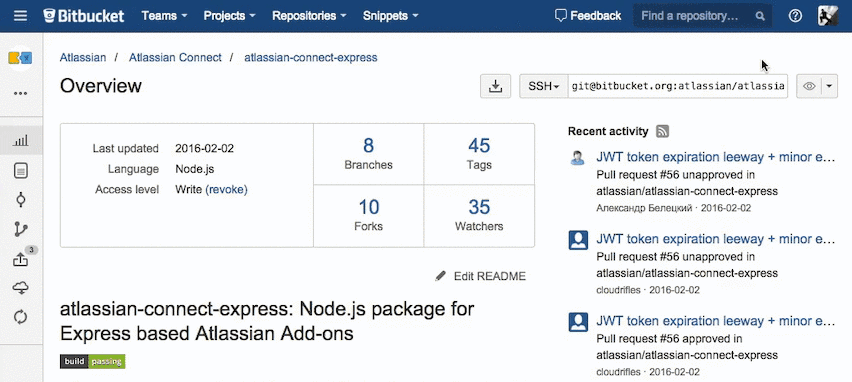
As soon as you start typing characters, it will search for repository names belonging to you or your team:
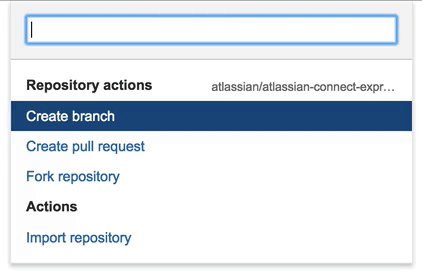
')
As well as task headers and pull requests for all your repositories:
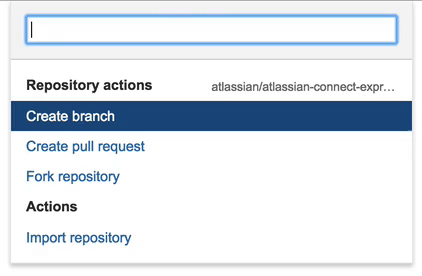
And even the files in the current repository by their name:

By the way, if besides Bitbucket you are using JIRA, try pressing the point key the next time you look at a task there.
Key to call omnibar - just one of the hot. Using ⇧ +? On any page you can see a list of context-sensitive shortcuts. Here are some of the ones that the Bitbucket team uses every day:
The modifier keys may vary depending on the browser and operating system — those listed are relevant for Chrome on OS X, so use the list of combinations (⇧ +?) In your browser to refine them.
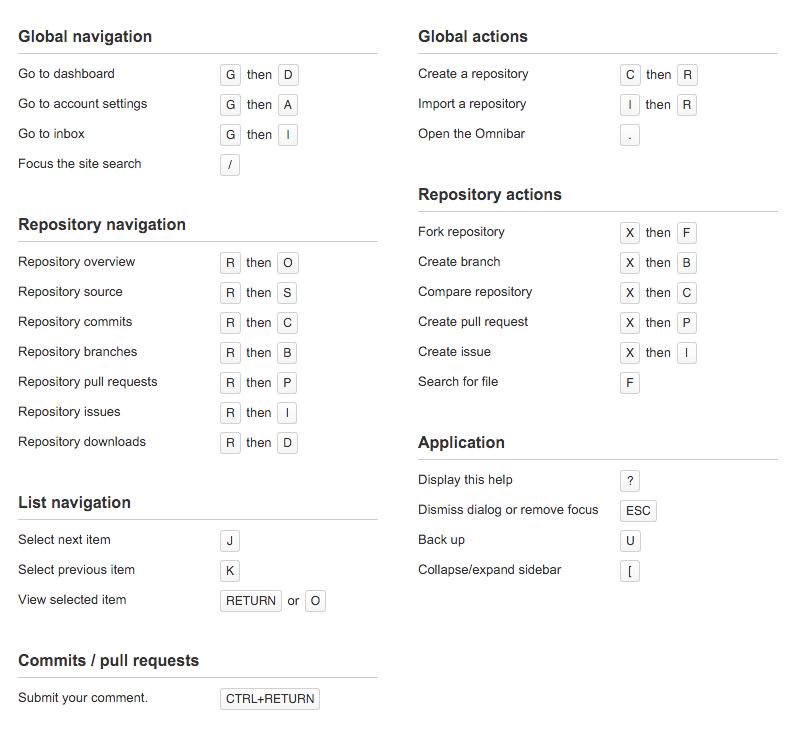
Even if you have already used Bitbucket snippets to share code, you may not be aware that you can share other types of files with them. Just drag and drop any file into the snippet area.

It can be an image, a video, and even a compiled code! The file size should not exceed 10 MB. There is also a handy console command for downloading files:

The Downloads page in the repository allows you to download an archive with its code in the state in which it was at the time of a certain commit. The archive can be
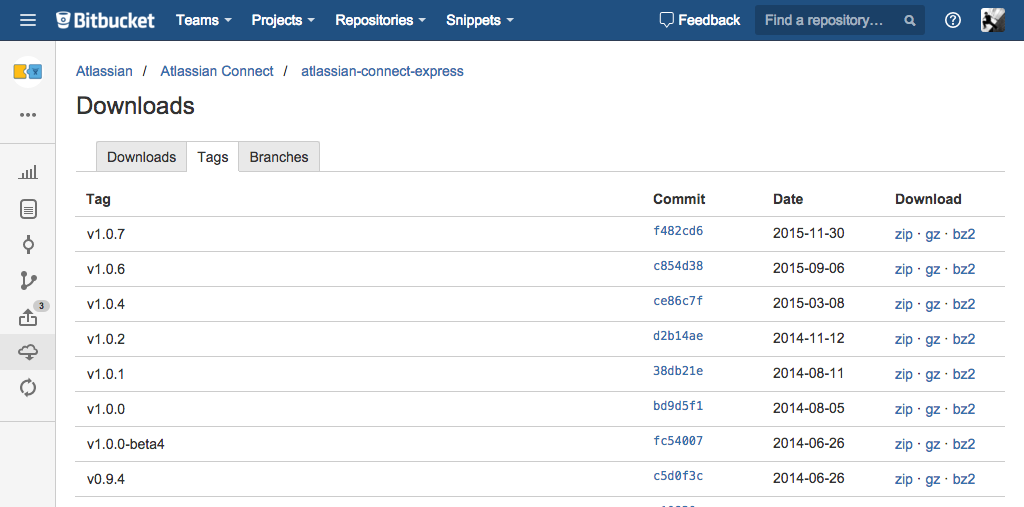
The URLs used in the links on this page look like this:
Here is the format of this link:
In fact, you can replace
Moreover, you can use links to parent commits - this is how you can refer to the second progenitor of the current
This can be very convenient for the needs of Continuous Integration and Continuous Delivery, when you need to download an image of the repository at the time of a certain commit. Git supports a bunch of ways to identify a commit , and besides, this method works with Mercuruial!
In June, we launched the Bitbucket Connect framework, which allows us to extend the Bitbucket user interface. Perhaps you have already used some of the third-party utilities that are integrated with Bitbucket using this framework. However, with Bitbucket Connect, you can change your own Bitbucket.
For example, this JSON is a standalone extension for Bitbucket Connect:
After installing in Bitbucket, the Download as ZIP link will appear on the commit pages - it will use the above-mentioned resource
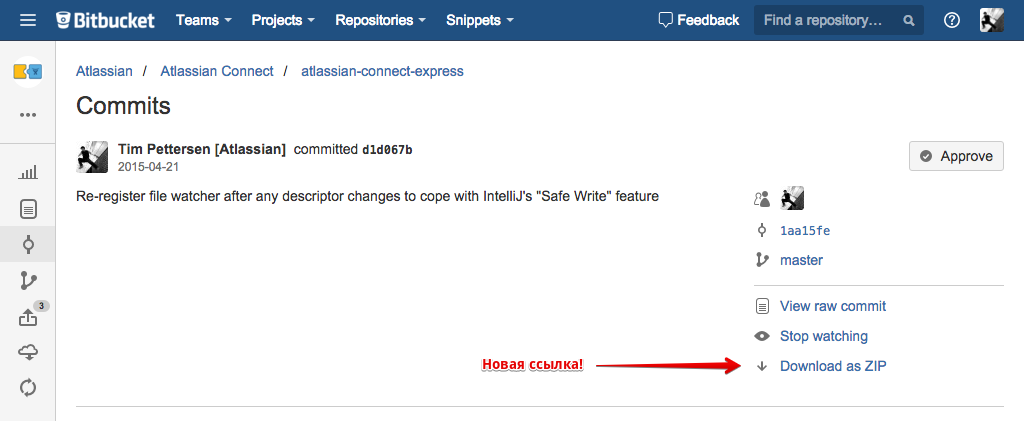
I have laid out this addon as a snippet , and you can install it yourself using this link .
You can use this method to add links to your repositories, visualize your code, or implement completely new features based on Bitbucket. The framework has documentation and a half-hour video lesson .
If you have read to here, then surely love all the newest. If this is the case, go to the Bitbucket settings and select Manage features in the menu on the left to enable pre-release features. By the way, right now there is an improved list of pull requests waiting for you there!

From time to time, look at the settings again, because the Bitbucket team often puts out teaser and beta versions long before the official release.
Thank you for reading! If you want to share your Bitbucket tricks, or if you have a cool idea for expansion, leave a comment here or email Tim @kannonboy on Twitter.
I’m happy to answer questions about these and other Bitbucket features. I hope some of these tricks will be useful for you.
The author of the original article, Tim Pettersen, participated in the development of JIRA, FishEye / Crucible and Stash. From the beginning of 2013, he talks about development processes, git, continuous integration and continuous integration / deployment, and Atlassian tools for developers, especially Bitbucket. Tim regularly posts notes about these and other things on Twitter under the pseudonym @kannonboy .
Omnibar
Omnibar in Bitbucket is a quick access line to actions, similar to ⇧⇧ in the JetBrains development environment or ⌘ + P in Sublime Text. You can launch the omnibar on any page by pressing the point key.
By default, it will show a set of actions corresponding to the current context :

As soon as you start typing characters, it will search for repository names belonging to you or your team:

')
As well as task headers and pull requests for all your repositories:

And even the files in the current repository by their name:

By the way, if besides Bitbucket you are using JIRA, try pressing the point key the next time you look at a task there.
Hotkeys
Key to call omnibar - just one of the hot. Using ⇧ +? On any page you can see a list of context-sensitive shortcuts. Here are some of the ones that the Bitbucket team uses every day:
- / - put the cursor in the search bar
- [- minimize / maximize side menu
- ⌃ + ⏎ - post a comment
The modifier keys may vary depending on the browser and operating system — those listed are relevant for Chrome on OS X, so use the list of combinations (⇧ +?) In your browser to refine them.

Binary snippets
Even if you have already used Bitbucket snippets to share code, you may not be aware that you can share other types of files with them. Just drag and drop any file into the snippet area.

It can be an image, a video, and even a compiled code! The file size should not exceed 10 MB. There is also a handy console command for downloading files:

Zip or tar any commit
The Downloads page in the repository allows you to download an archive with its code in the state in which it was at the time of a certain commit. The archive can be
zip , tar.gz or tar.bz2 :
The URLs used in the links on this page look like this:
bitbucket.org/atlassian/atlassian-connect-express/get/v1.0.4.zipHere is the format of this link:
bitbucket.org/<repo_owner>/<repo_name>/get/<revision>.<zip|tar.gz|tar.bz2>In fact, you can replace
<revision> any unique commit identifier. For example, specifying its short SHA-1 hash: bitbucket.org/.../get/badc0de.zipMoreover, you can use links to parent commits - this is how you can refer to the second progenitor of the current
master branch: bitbucket.org/.../get/master^2~2.zipThis can be very convenient for the needs of Continuous Integration and Continuous Delivery, when you need to download an image of the repository at the time of a certain commit. Git supports a bunch of ways to identify a commit , and besides, this method works with Mercuruial!
Interface Setup
In June, we launched the Bitbucket Connect framework, which allows us to extend the Bitbucket user interface. Perhaps you have already used some of the third-party utilities that are integrated with Bitbucket using this framework. However, with Bitbucket Connect, you can change your own Bitbucket.
For example, this JSON is a standalone extension for Bitbucket Connect:
{ "key": "download-commit-as-zip", "name": "Download commit as ZIP", "description": "Adds a \"Download as ZIP\" link to the commits page on Bitbucket", "baseUrl": "https://bitbucket.org", "modules": { "webItems": [{ "key": "download-link", "url": "https://bitbucket.org/{repo_path}/get/{commit_hash}.zip", "name": { "value": "Download as ZIP" }, "location": "org.bitbucket.commit.summary.actions", "params": { "auiIcon": "aui-iconfont-down" } }], "oauthConsumer": { "clientId": "WaLh6mhKdRUDpVcXAH" } }, "scopes": ["team"], "contexts": ["personal"] } After installing in Bitbucket, the Download as ZIP link will appear on the commit pages - it will use the above-mentioned resource
/get/<revision>.zip :
I have laid out this addon as a snippet , and you can install it yourself using this link .
You can use this method to add links to your repositories, visualize your code, or implement completely new features based on Bitbucket. The framework has documentation and a half-hour video lesson .
Enable pre-release features
If you have read to here, then surely love all the newest. If this is the case, go to the Bitbucket settings and select Manage features in the menu on the left to enable pre-release features. By the way, right now there is an improved list of pull requests waiting for you there!

From time to time, look at the settings again, because the Bitbucket team often puts out teaser and beta versions long before the official release.
For today everything
Thank you for reading! If you want to share your Bitbucket tricks, or if you have a cool idea for expansion, leave a comment here or email Tim @kannonboy on Twitter.
I’m happy to answer questions about these and other Bitbucket features. I hope some of these tricks will be useful for you.
The author of the original article, Tim Pettersen, participated in the development of JIRA, FishEye / Crucible and Stash. From the beginning of 2013, he talks about development processes, git, continuous integration and continuous integration / deployment, and Atlassian tools for developers, especially Bitbucket. Tim regularly posts notes about these and other things on Twitter under the pseudonym @kannonboy .
Source: https://habr.com/ru/post/278547/
All Articles